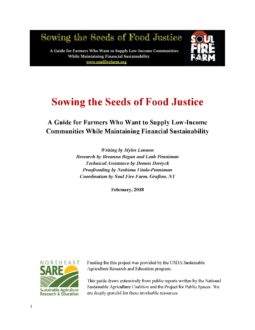This manual offers strategies and insights to help farmers run a small farm business that supports the needs of low-income communities. It is drawn from the lived experiences of farmers at Soul Fire Farm, a family farm working to end racial and economic injustice in the food system, and partner farms as well as research on resources and best practices for serving low-income communities in the local food and agricultural sector.
The publication is broken up into five sections:
- An overview of the Soul Fire Farm food distribution model,
- Barriers to accessing fresh food in low-income communities,
- Strategies and best practices for serving low-income communities,
- Government resources for affordably meeting the nutritional needs of low-income communities, and
- Case studies to illustrate the ways in which farmers across the country have worked with other organizations in their community to make their produce accessible to their low-income neighbors while keeping their farms financially stable.
The manual is predominantly focused on community supported agriculture (CSA) and farmers markets.
Want more information? See the related SARE grant:
This material is based upon work that is supported by the National Institute of Food and Agriculture, U.S. Department of Agriculture through the Sustainable Agriculture Research and Education (SARE) program. Any opinions, findings, conclusions, or recommendations expressed in this publication are those of the author(s) and should not be construed to represent any official USDA or U.S. Government determination or policy.
